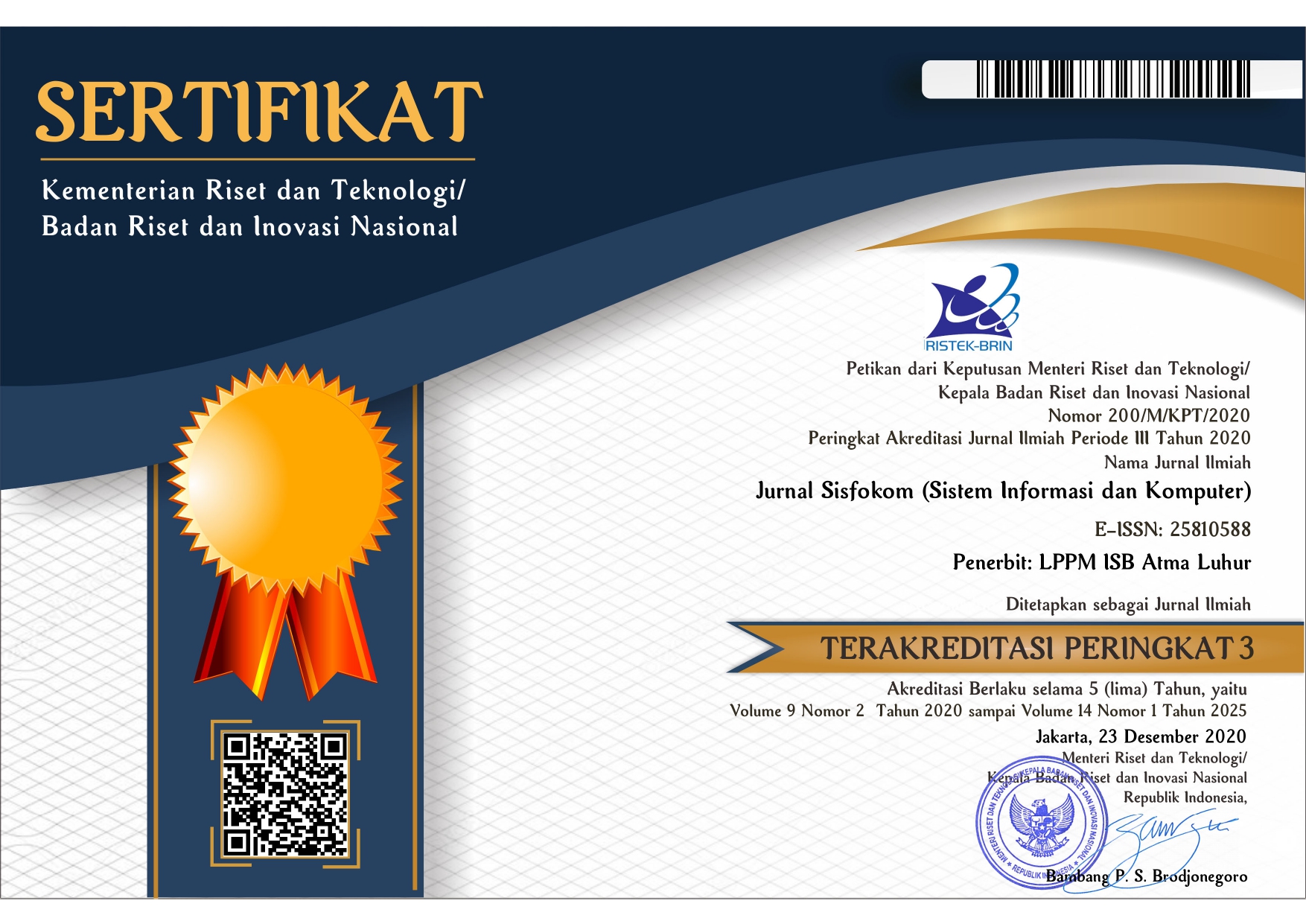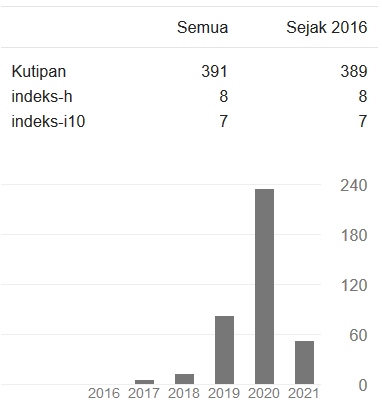Analysis the Application of the Weighted Product Method in Decision Support Systems for Assistance Programmes for MSMEs
DOI:
https://doi.org/10.32736/sisfokom.v13i1.1777Keywords:
Productive Assistance for Micro Enterprises, Decision Support Systems, Micro Small and Medium Enterprises (MSME), Weighted ProductsAbstract
Productive Micro Business Assistance (BPUM) is a government policy. This assistance has been carried out since the Covid-19 Pandemic in Indonesia. The Mojokerto city government conducts a selection of MSMEs which is expected to avoid errors in determining MSME assistance. Therefore, a decision support system is needed that is developed using the Weighted Product method to make it easier and faster to determine MSMEs that are eligible to receive assistance. The stages of system development start from problem analysis, data collection, analysis of method application, and system development. Based on the calculation of the resulting S vector, the largest value is 0.10568 and the smallest value is 0.05886 from 9382 MSME data. The last calculation is the V vector value which produces recommendations in the form of data ranking that can be used by the Mojokerto City Diskopukmperindag to determine which MSMEs are entitled to receive assistance. The results of the selected alternatives are in accordance with the ranking with the largest value of 0.10568 and the smallest value of 0.05886. Providing recommendations by the decision support system to policy makers can be based on the largest relative preference value owned by MSMEs.References
Z. Sufiani, “Definisi,Kriteria dan Konsep UMKM,” Osfpreprints, no. 90500120021, pp. 1–13, 2022.
D. Chaerani, M. N. Talytha, T. Perdana, E. Rusyaman, and N. Gusriani, “Pemetaan Usaha Mikro Kecil Menengah (Umkm) Pada Masa Pandemi Covid-19 Menggunakan Analisis Media Sosial Dalam Upaya Peningkatan Pendapatan,” Dharmakarya, vol. 9, no. 4, p. 275, 2020, doi: 10.24198/dharmakarya.v9i4.30941.
N. Fernandes, “Economic effects of coronavirus outbreak ( COVID-19 ) on the world economy Nuno Fernandes Full Professor of Finance IESE Business School Spain,” SSRN Electron. Journal, ISSN 1556-5068, Elsevier BV, pp. 0–29, 2020.
R. T. Wijayanti, M. Najib, and M. Aminah, “The Effect of Entrepreneurial Marketing Perceptions on MSMEs Business Performance During Covid-19 Pandemic in Bogor City,” Indones. J. Bus. Entrep., vol. 8, no. 1, pp. 24–37, 2022, doi: 10.17358/ijbe.8.1.24.
A. F. Thaha, “DAMPAK COVID-19 TERHADAP UMKM DI INDONESIA,” J. Brand, vol. 2, no. 1, p. 1, 2020, [Online]. Available: https://ejournals.umma.ac.id/index.php/brand
M. Rozzaq and A. Widiyarta, “Implementasi Program Bantuan Bagi Pelaku Usaha Mikro Di Kecamatan Gubeng Kota Surabaya,” J. Publicuho, vol. 4, no. 2, pp. 315–325, 2021, doi: 10.35817/jpu.v4i2.17858.
A. Sidabutar, R. K. Purba, and M. Mesran, “Sistem Pendukung Keputusan Pemberian Bantuan Umkm Pada Dinas Koperasi Menerapkan Metode Ocra,” Escaf, pp. 1241–1251, 2022.
S. F. Pantatu and I. C. R. Drajana, “Sistem Pendukung Keputusan Penerima Bantuan UMKM Menggunakan Metode MAUT,” J. Nas. Komputasi dan Teknol. Inf., vol. 5, no. 2, pp. 317–325, 2022, doi: 10.32672/jnkti.v5i2.4207.
I. Sugiana, A. I. Hadiana, and P. nurul Sabrina, “Pengambilan Keputusan untuk Memilih UMKM yang Layak Mendapatkan Bantuan Menggunakan Metode Simple Additive Weighting (SAW),” Snestik, pp. 351–356, 2022.
C. P. S. Heru Supriyono, “Pemilihan Rumah Tinggal Menggunakan Metode Weighted Product,” Khazanah Inform. J. Ilmu Komput. dan Inform., vol. 1, no. 1, pp. 23–28, 2015.
O. Fajarianto, M. Iqbal, and J. T. Cahya, “Sistem Penunjang Keputusan Seleksi Penerimaan Karyawan Dengan Metode Weighted Product,” J. Sisfotek Glob., vol. 7, no. 1, pp. 49–55, 2017.
Oktafianto et al., “Determining housing location using weighted product,” Int. J. Eng. Technol., vol. 7, no. 4, pp. 3563–3568, 2018, doi: 10.14419/ijet.v7i4.18838.
H. Pratiwi, “Penjelasan sistem pendukung keputusan,” Spk, no. May, p. 3, 2020, [Online]. Available: https://www.researchgate.net/publication/341767301%0APENJELASAN
B. Patnandi, D. Mustikasari, and I. Puji Astuti, “Sistem Pendukung Keputusan Penerimaan Bantuan Pelaku Usaha Mikro Untuk Umkm Menggunakan Algoritma Electre (Elimination and Choice Translation Reality),” JIKO (Jurnal Inform. dan Komputer), vol. 6, no. 1, p. 115, 2022, doi: 10.26798/jiko.v6i1.480.
S. Hanief, “Penggunaan Algoritma FMADM pada Sistem Pendukung Keputusan untuk Seleksi Penerima Bantuan Dana Pendidikan Untuk Mahasiswa Tidak Mampu atau Kurang Mampu pada Yayasan Rumah Singgah XYZ,” Eksplora Inform., vol. 1, no. 1, pp. 6–16, 2011, [Online]. Available: https://eksplora.stikom-bali.ac.id/index.php/eksplora/article/view/171/119
A. Ahmadi and D. T. Wiyanti, “Implementasi Weighted Product (WP) dalam Penentuan Penerima Bantuan Langsung Masyarakat PNPM Mandiri Perdesaan,” Semin. Nas. Apl. Teknol. Inf., pp. 19–22, 2014.
A. I. Firmansyah, “Pengaruh Pertumbuhan Usaha Mikro, Kecil, Dan Menengah Terhadap Pertumbuhan Ekonomi Di Tulungagung,” Pengaruh Pertumbuhan Usaha Mikro, Kecil, Dan Menengah Terhadap Pertumbuhan Ekon. Di Tulungagung, vol. 53, no. 9, pp. 1689–1699, 2019.
Marihot Nasution, “BPUM: Program Baru Bagi UMKM di Tengah Pandemi Covid-19,” Bul. Apbn, vol. V, pp. 11–15, 2020.
Nurhayati, R. Hayami, and Y. Fatma, “Penerapan Metode Weighted Product ( WP ) Sebagai Pendukung Prioritas Penerima Bantuan Pinjaman Modal UMKM,” Pros. Semin. Nas. Comput. Technol. its Apl., vol. 1, no. 1, pp. 41–46, 2019.
Downloads
Published
Issue
Section
License
The copyright of the article that accepted for publication shall be assigned to Jurnal Sisfokom (Sistem Informasi dan Komputer) and LPPM ISB Atma Luhur as the publisher of the journal. Copyright includes the right to reproduce and deliver the article in all form and media, including reprints, photographs, microfilms, and any other similar reproductions, as well as translations.
Jurnal Sisfokom (Sistem Informasi dan Komputer), LPPM ISB Atma Luhur, and the Editors make every effort to ensure that no wrong or misleading data, opinions or statements be published in the journal. In any way, the contents of the articles and advertisements published in Jurnal Sisfokom (Sistem Informasi dan Komputer) are the sole and exclusive responsibility of their respective authors.
Jurnal Sisfokom (Sistem Informasi dan Komputer) has full publishing rights to the published articles. Authors are allowed to distribute articles that have been published by sharing the link or DOI of the article. Authors are allowed to use their articles for legal purposes deemed necessary without the written permission of the journal with the initial publication notification from the Jurnal Sisfokom (Sistem Informasi dan Komputer).
The Copyright Transfer Form can be downloaded [Copyright Transfer Form Jurnal Sisfokom (Sistem Informasi dan Komputer).
This agreement is to be signed by at least one of the authors who have obtained the assent of the co-author(s). After submission of this agreement signed by the corresponding author, changes of authorship or in the order of the authors listed will not be accepted. The copyright form should be signed originally, and send it to the Editorial in the form of scanned document to sisfokom@atmaluhur.ac.id.









